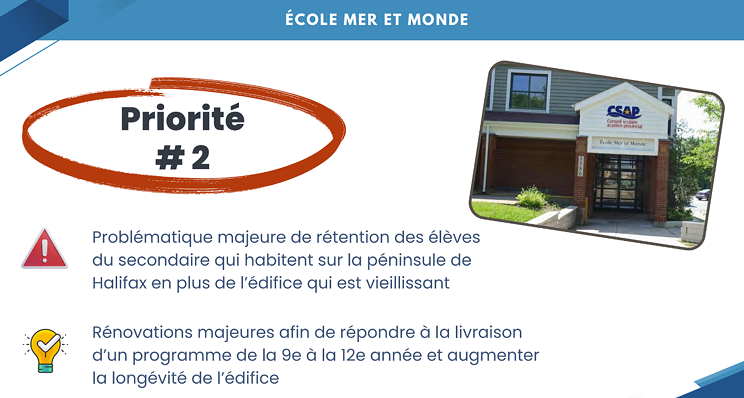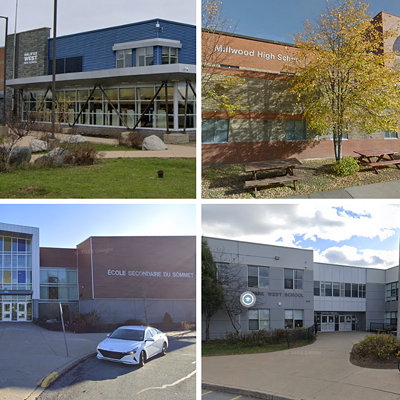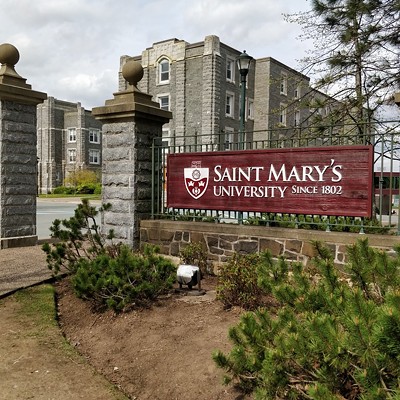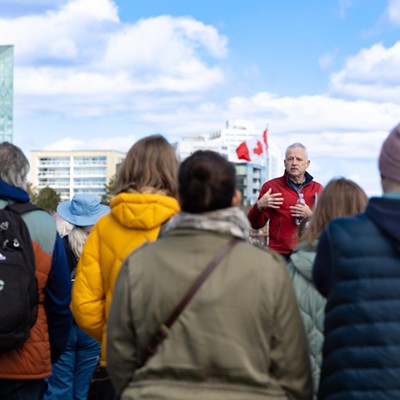In 2020, voters elected Jeff Arsenault to the Conseil scolaire acadien provincial–CSAP, the province’s French school board–as one of three representatives for Halifax.
The CSAP has 18 elected members province-wide, who are responsible for a school system of 23 Acadian and French-language schools that served 6,170 students in Nova Scotia last year. Halifax has over half of those students at 3,225, far more than even an area like Argyle, which is home to one of the world’s oldest Acadian communities and 633 French-speaking students.
But Halifax is not over-represented on the school board; both Halifax and Argyle have three seats, leaving Halifax with just one sixth of total board seats. Using a CSAP statistic that looks at the number of voters in a rep's geographic region, Halifax three board members Arsenault, Marc Pinet and Katherine Howlett each represent 157% more voters than the provincial average of voters per school board rep. (In Argyle, that number is -36% than average.)
Great power, great responsibility–yada yada.
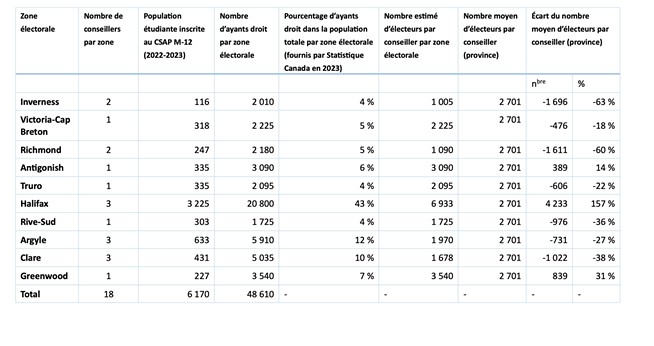
Except Arsenault doesn’t have his seat at the voting table right now, as he was suspended by the board in November. The rest of the board voted unanimously to suspend Arsenault on Nov. 4, based on a motion that says he violated the CSAP’s code of ethics by speaking with Radio-Canada and criticizing the CSAP and its president, and by sharing confidential CSAP information with journalists including cc’ing them on emails with the board where he was critical of the CSAP.
Arsenault is the only member who lives on the peninsula, and his seat will be vacant until his suspension ends on Feb. 4. However, he’s still an elected representative of 157% more voters than the provincial average. And he is also the only Halifax representative who responded to The Coast about the CSAP’s plans for Halifax schools. Pinet and Howlett haven’t responded to multiple requests for comment.
Even though the CSAP board has temporarily shrunk to 17 members with Arsenault's suspension, Halifax is still better-represented on the French board than in English. That’s because there are exactly zero elected English school board members in all of Nova Scotia. In 2018, then-education minister, now-Liberal Party leader Zach Churchill dissolved the seven elected regional English school boards in favour of a single provincial advisory council whose members would be appointed by the minister of education.
The CSAP board, on the other hand, is elected every four years by their communities. CSAP's administration reports to the provincial minister of education, currently Becky Druhan, but the CSAP is responsible for advocating for the right to equal education for their communities, governing their own schools and identifying gaps in school infrastructure.
Arsenault has long advocated for a CSAP high school on the peninsula, going back to before he was elected to the board. This is not his fight alone—many parents have expressed how strongly they want a peninsula high school directly to CSAP.
Before 2019, the high school in Bedford–École Secondaire du Sommet–and the École du Carrefour near Cole Harbour were the only two high school options for CSAP students in the HRM. But that year, the province announced the $28.5 million purchase of a high school in Dartmouth’s Burnside Industrial Park that would serve 900 CSAP students. It opened in September 2020 as École secondaire Mosaïque.
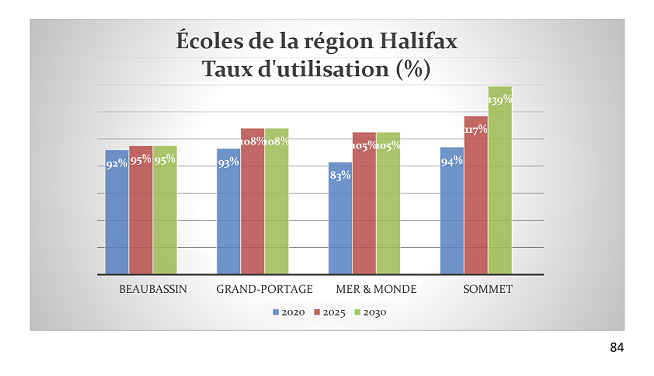
Mosaïque was built to alleviate overcrowding at Sommet, however when the Burnside high school was announced families expressed mixed feelings about it. Families had warned that not all peninsula kids would make the trip to Burnside, and that facing the prospect, many would likely switch out of CSAP schools before or at high school age and transfer into the English schools’ French immersion programs.
The CSAP's then-board president, Louise Marchand, wrote a response letter in French to EMM parents: "It's very clear from the EMM parents' survey from Dec. 7 2019 that the community wants to have two peninsula schools: one elementary and one secondary. You have asked for the [CSAP] to reverse its January 2019 decision [to create a single Pre-primary through Grade 12 school]. However, the [CSAP] can't reverse reverse its decision because the reasons for making that decision haven't changed. We have the chance to offer a new school to the peninsula community and we believe that in the long term, a new building on the peninsula will be best for the community. The risk that the peninsula community ending up with only [EMM] ( "another old school") and not getting a new building is too high for the [CSAP.]"
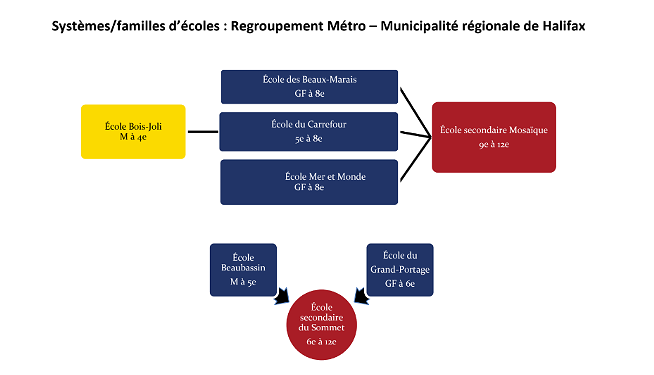
Over his term, he’s become frustrated with the board over the purchase of Mosaïque instead of fighting for an urban high school on the peninsula. The Canadian Charter of Rights and Freedoms guarantees minority linguistic rights, yet he questions whether these rights are being fulfilled for CSAP families in Nova Scotia with this division between access to French and English educational infrastructure within Halifax.
Citadel High is an urban school. It’s centrally located on the peninsula, near major bus routes. It’s on a street with a bike lane, minutes from downtown Halifax. There are crosswalks for students at each entrance. It’s across from soccer fields, baseball diamonds, Citadel Hill, the Natural History Museum and a public skating rink and swimming pool.
Arsenault wants CSAP students to have that experience. His own daughter, Claire, is likely to switch to Citadel for the fact that CSAP doesn’t currently offer that same thing.
Claire is in Grade 6 at EMM. That school is what’s known as PP-9, with classes from Pre-primary through to Grade 9. When she graduates in a few years, she plans on transferring to French immersion at Citadel, and she won’t be the only student making the switch. Although some of her friends are planning to commute to Burnside for Mosaïque, as Arsenault’s son has done, CSAP’s own data shows that 75% of students switch out of CSAP after graduating from EMM in Grade 9, which means they transfer to an English school like Citadel.
“Mosaïque is just a bit too far for me personally,” Claire says. Although she’d like to keep learning at a CSAP school, she’d rather be closer to home and be able to walk to school if she wants. Like most kids, she likes the social aspect of school, but at this point it seems Claire’s friend group will ultimately be divided between Citadel and Mosaïque.
Mosaïque was designed to “reduce enrolment pressures at other CSAP schools in the Halifax area.” However, its enrolment just above 50% capacity–it’s in an industrial park that’s roughly 20 minutes away by car or 40 by school bus from the peninsula.
The obvious solution is a CSAP high school on the peninsula, the French equivalent of Citadel.
In 2021, the province announced what could have been just that: a new CSAP school to be built in Halifax’s west end. However, the “School on the Peninsula,” as it’s referred to on CSAP’s site, is designed as a Pp-8 rather than as a high school. It’s currently under construction at the corner of Bayers Road and Oxford Street, and is scheduled to be open to students in September 2025.
Which brings us to the missing Grade 9 problem.
Students in the school district of EMM will belong to the district of the new Bayers Road school once it opens. The decision of what will happen to the EMM building, says the CSAP, is up to the province. If EMM closes, the peninsula will have replaced its Pp-9 school with a new Pp-8 school.
This can only exacerbate the dilemma facing students who’d rather not commute to high school in Burnside.
As of today, students with civic addresses on the peninsula finish Grade 9 at EMM and transfer to Mosaïque in Grade 10. That’s how it’s set up by CSAP and their school bus partner, Transco. For parents registering with CSAP for the 2025/26 school year, the official idea is almost certainly for Bayers Road to become a feeder school for Mosaïque beginning at Grade 9.
But commuting to Burnside is so unappealing that 75% of students coming out of Mer et Monde decide to avoid it, suggesting the majority of students who finish Grade 8 at Bayers won’t go to Mosaïque for Grade 9, either. And if a student who wants to stay on the peninsula faces being forced out of CSAP schools after Grade 8, they may well decide to opt out even earlier to better maintain friend groups through junior high. That means leaving the CSAP system after elementary school and starting junior high on the peninsula with everyone else, at one of the feeder schools to Citadel. Probably not the outcome CSAP is aiming for when the province builds it a new school.
A year ago, in January 2023, CSAP’s board (including Arsenault) voted unanimously to direct CSAP’s administration to officially request a peninsula high school from the province.
This would serve as a high school for Bayers' graduates and provide an option for kids wanting to stay in CSAP schools nearby to where they live. The board and administration agreed that renting commercial space could work as a smaller, temporary alternative to building an entirely new high school or costly renovations of an old school. Part of that plans appeal was the potential to welcome in students in time for the school year starting in September 2023. By springtime, Arsenault thought the temporary rental plan was “in the bag.” As Arsenault remembers it, the CSAP’s executive director, Michel Collette, “kept repeating that he was working on it as if it was happening all of last year–and it just didn't happen. He had even said he was buying furniture.”“Some clarity would be appreciated."
tweet this
There wasn’t a French high school ready last September. The Coast reached out to the CSAP to see what became of that idea. The CSAP’s communications coordinator responded by email saying the temporary rental school project is still actively being discussed with the province, however no information has been shared on their website.
In November 2023, CSAP’s administration submitted their list of infrastructure priorities to the province for review and approval. Their top priority is a new Grade 4-8 school for Sackville/Bedford to reduce overcrowding in four nearby CSAP schools. A high school for the peninsula is in second place on the list, but not in the form of the January 2023 plan to rent commercial space for it. Instead, there’s a brand-new idea: Taking the EMM building, which the Bayers school will replace, and converting it into a peninsula high school. A spokesperson for the province’s Department of Education and Early Childhood Development–the EECD– says about this proposal: “A final decision has not yet been made.”
If the EECD decides to approve the CSAP's priority two plan for EMM, that news will be included in the province’s annual Capital Plan, published every year around budget season. As of today, the EECD says “no decisions have been made” about adding new CSAP schools to their upcoming Capital Plan.
CSAP parent Jean-Phillipe Bourgeois has two kids at EMM right now. He thinks parents should be consulted before the CSAP decides where students will go to school for Grade 9. On Dec. 21, he sent an email, in English, to the CSAP and the EECD asking where his kids would be graduating junior high. He writes, “Some clarity would be appreciated.”
The first to respond to Bourgeois’ email thread was a member of the EECD who works on capital projects. Replying on Jan. 3, Tyler Bell with the EECD says the Bayers school was approved and designed for programming for Grades Pp-8, but that “initial program configuration of new schools is typically recommended by the education entity, in this case the CSAP.”
Bell says it’s the responsibility of the CSAP to determine the best use of the schools and suggests Bourgeois therefore “continue your inquiry regarding future grade configurations with the CSAP."
Bourgeois did just that, switching to writing in French as he redirected his email thread back to CSAP’s president and elected member of CSAP’s board, Diane Racette, to respond to. He added Halifax’s three CSAP members to the thread, as well as CSAP’s executive director, Collette.
“It is unfathomable that there is no plan for my children who will enter grade 9 at that time.”
tweet this
In French, Racette responded to the thread, minus Bell, the next day. Racette confirmed that the configuration of schools, including which schools offer which grades, falls under CSAP’s jurisdiction. She wrote that the CSAP intends to “further explore options for Grade 9” once they have a firm opening date for the Bayers school. Racette said “several options are possible, such as an urban school on the peninsula,” but didn’t definitively say where peninsular Grade 9 students would go in September 2025. She didn’t confirm that they would go to Mosaïque.
Bourgeois then redirected the thread back to the EECD, keeping the CSAP reps cc’d but writing in English, asking the minister of education, Becky Druhan, to “intervene and provide parents with clarity” saying “this is your right as minister–at worst ask the CSAP to provide promptly parents with an answer to this question” of what’s happening with Grade 9. As Bourgeois writes, “It is unfathomable that there is no plan for my children who will enter grade 9 at that time.”
Arsenault, although suspended from meetings, was within his duties when he chimed in on the email chain, the only one of Halifax’s three CSAP members to do so. In French, he asked Racette to clarify whether Mosaïque was their Grade 9 plan; she didn’t reply.
That same day, Bourgeois wrote back to the thread in French asking whether Mosaïque was the solution or not. CSAP’s executive director Collette responds to the thread in French indicating he’d spoken to Bourgeois by phone and thanking Bourgeois for their conversation. Bourgeois replies to the thread in French hours later asking for Collette to confirm that: “As of now there’s no concrete plan for Grade 9 so the options would be: 1. Send our kids to Mosaïque, 2. Add a year to the new school at Oxford/Bayers, 3. A hypothetical new urban school–so far there isn’t one.”
Bourgeois writes in this email that he was told, likely by Collette over the phone, that parents can expect an answer 12 months before Bayers opens to students in September 2025. If so, Bourgeois and other parents are due an answer in less than 9 months.
Bourgeois and his son presented at the CSAP’s latest general meeting, Saturday, Jan. 20, which was open to the public and happened over Zoom, in French. Bourgeois asked the board to ensure parents are consulted on school decisions about Grade 9 before the CSAP makes that choice for them.
What Arsenault is also hoping for, as both an elected CSAP board member and a parent, is answers about where kids will go for Grade 9.
“Everybody should get what they deserve,” says Arsenault, including CSAP families across the province in both rural and urban areas. Arsenault says it’s parents, not students, who are actually the “rights holders” to equal education opportunities in Canada. To him, CSAP’s ask to the province should be: “We want some of the Anglophone school buildings [that] we have a right to have. If for political reasons the government doesn't want to do that–that's fine. But provide us with a service nonetheless.”
Of course, Arsenault wants permanent CSAP educational services. But in the interim, Arsenault told executive director Collette and board president Racette that he’d be happy with rented spaces in each community in the HRM that allows for accessible Pp-12 education open September 2024.
“That’s what I told them. It’s 100% impossible to achieve–I know that–but why can’t we shoot for it?” At minimum, a Halifax peninsula model could be tested and reproduced in other communities, if successful.
For their part, CSAP’s communications coordinator wrote in an email to The Coast that once they have a firmer opening date for the new Bayers school, “the elected board will be able to discuss the options for students,” and that “parents will continue to be informed throughout the process.”
On Jan. 18, Collette published the CSAP’s “new 2024-2030 strategic plan” on the CSAP website. “The education system has a duty to progress according to the needs, aspirations and collective values of the community it serves,” Colette writes in French in the news release.
Collette writes, “Over the coming months, our team will work with our school communities to bring this plan to fruition. I am convinced that this approach will make our education system shine, making us a model for those who wish to be inspired by our innovative practices.”
The new strategic plan doesn't include what will happen for Grade 9 students on the peninsula. Multiple requests for interviews with members of CSAP's administration and board, including their two officially mandated spokespeople, Racette and board vice-president Clyde deViller, were denied.

